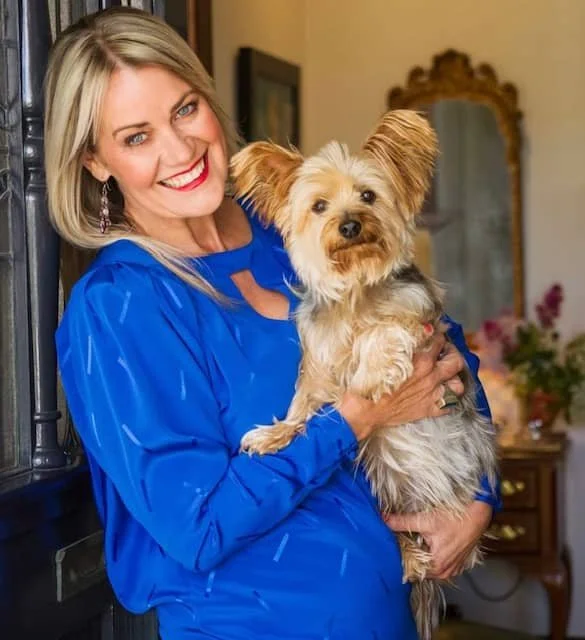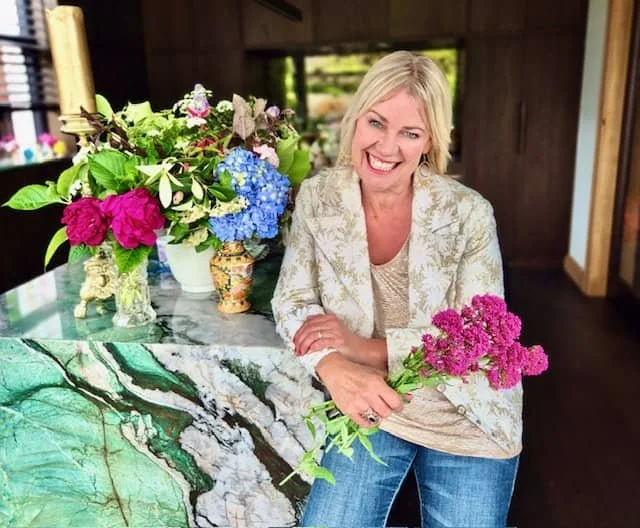Melanie Kerr, celebrant
“Telling the truth right at the beginning will save discomfort and distress down the line.”
Melanie Kerr is a Dunedin-based celebrant who often finds herself officiating at the funerals and memorials of parents who have left behind young children. There’s always a place for the children in a funeral service, she says.
“Whether it’s an expected death, maybe someone who has been battling a terminal illness, or whether it’s a sudden death through an accident, no amount of preparation really prepares us, and adults can often get caught up in their own grief and loss,” says Dunedin celebrant, Melanie Kerr.
“There’s so much to organise over the few days between someone dying and their funeral. While a grieving family will try to do the best for their kids, so much is happening it can be very hard to balance where children fit into it all.”
Melanie Kerr – celebrant
Melanie is exactly the sort of person I’d want officiating at a particularly sensitive funeral. She didn’t lose a parent young, but she totally gets what children need when a parent dies.
“First of all, I believe families should sit down and tell children that their parent has died. Using clear and precise language is always best, rather than analogies. It’s very hard to say, ‘Mummy is dead and she’s not coming back’, but it’s much better for the child than, ‘Mummy has gone to sleep and won’t wake up’. What is the child to think, then, when it’s time for them to go to sleep? Will they not wake up?
“If you use clear language, so the child understands, honest conversations can continue. Telling the truth right at the beginning will save discomfort and distress down the line.
“I remember a little girl, a preschooler, whose mother had died and the adults hadn’t told her. She knew her mum was unwell, but her dad, in his grief, didn't know how to tell her. He asked me to do it.
“I said to her, ‘You know that Mummy was sick in hospital? Well, now Mummy has died and that means she's not coming back’. The little girl then said she wanted to do some colouring in with me. I sat beside her and we coloured together. A wee while later she said to me, ‘The butterflies died. Mummy's butterflies died’. She had taken her moment to think about what I’d said, and she processed it.
“You don't need to over-complicate things by explaining – just tell them the truth. Kids will process it in their own time, and they'll come back to you with questions and conversations. That insightful, beautiful little girl said to me ‘the butterflies died’, so she did get it. She knew. Because of that, I wove butterflies into her mum's service. I introduced some beautiful blessings and readings about butterflies and transformation. I knew the wee girl would understand that.”
Families might wonder if it’s a good idea to include children in their parent’s funeral organisation. They may fear it’s too much for them, too adult, that talking about a funeral may be upsetting. Certainly in the interviews I have done, those who were most upset by their parent’s funeral – an upset that has lingered for decades – were those who were excluded. Or those who didn’t understand what happened at a funeral, at a wake, because it wasn’t explained to them.
Melanie encourages families to include children in an age-appropriate way.
“In my experience, which is sadly all too big, I’d say any gentle way you can include children in that process, the better. They are little eyes and little ears, and they're listening. They've heard conversations, they see what’s happening, and they know what’s going on. They are way more resilient than adults think they are, so to exclude them, even if you feel it’s for their own protection, is potentially detrimental in the long run.
“Show them your grief. You can't protect kids from that. The worst has already happened – Mum or Dad has gone. You can’t shelter them from that reality.”
When Melanie first meets with a family as their funeral celebrant, she immediately gauges whether the children are into being involved or not. “I might ask if they have any ideas for Mum or Dad’s special day? I might suggest they do a reading, choose some favourite songs, say some words about what their parent means to them.
“I might suggest they be a pallbearer, or if they’re small at least have their hand on the coffin as it’s being carried out. If they can’t or don’t want to do much, maybe they could just light a candle. It's important the children are acknowledged in some positive way even if they aren’t playing a specific role in the service.”
Not all children want to be involved in funeral planning. If they don’t, Melanie recommends finding other ways they can contribute.
“If they’re on a farm, maybe they can go and move the cows, or maybe they can take the dog for a walk – getting kids involved with animals is good. Maybe the children can bake for the ‘cup of tea’ after-service get together. Maybe they can look after other kids so the adults can talk and plan. They’re still helping, still contributing, without being loaded with responsibility.
“On the other hand, don’t put too much responsibility on the child. Don’t say, ‘You’re the man of the house now’, or, ‘You must look after your brothers and sisters’. That’s not what a child needs right now.”
There’s also the question of whether children should see their parent’s body. For most children – even adult children – seeing their parent after they have died is the first time they have seen a dead body, and it’s not an experience easily forgotten. Melanie says, like everything, just talk it through.
“I would always encourage parents to help guide the child through to see their parent after they've passed. I’d encourage them to say it's not scary, that death and being with the person after they’ve died can be a beautiful, natural progression, a gentle transition. It’s good for kids to see that.
“It’s not in everyone’s culture to bring the body home but I think that’s a good thing because it helps children process that death is a part of life. That body is still the person they loved, and the person who loved them. Those hands are still the hands that held them. Whatever religion or beliefs they might attach to where they have gone after they passed, this is still their parent.”
Melanie also encourages families to ask their children’s friends to be with them in the days after the death, and to come to the funeral – always after asking the child if that’s something they want. “Together they might talk, and children can process things with their friends. It’s such a beautiful thing to see friends there to say goodbye to their friend’s parent.”
Melanie aims to keep a service with small children involved as light as she can. “I always say to kids, ‘You are going to hear some beautiful stories about your parent today. You’re going to hear how strong and clever and kind they were. You should always remember that those things are in you too, because she's your mum or he’s your dad. They can never be taken away even through death. That doesn’t separate you from them’.”
As for caring for children during the service, Melanie recommends planning for someone to be responsible for looking after the children, but not to stress if things don’t go to plan. “I often end up having children in my arms during a service. In one instance, the surviving parent was so grief stricken they hadn’t considered what to do with their child. I don’t mind. Sometimes it’s just how it all evolves on the day.
“I always say, ‘Let the little people run, let them come and go’. So long as they’re not overly disruptive, I think it's important they are happy and that they know this is Mum or Dad’s special day.”
And if children do cry, that’s okay, Melanie says. Emotions are okay. And there could be other reasons for the tears.
“At a service, a wee girl suddenly started crying and crying. Everyone was worried, like, ‘Oh no, she’s crying because her mum has just died!’ But no, it was because her iPad’s battery had died! So I said, ‘Bubba, can you come up and blow that candle out for me’, because distraction is everything. She did, and then I asked if she wanted to say something into the microphone. She nodded, so I picked her up, she leaned forward and said, ‘bum bum’ into the mic. We were all in fits of laughter. We were all there for this little girl’s mother, and no one was thinking anything about how a funeral ‘should be done’.”
Melanie says to remember this point when devising a funeral service for anyone – it must work for the family. “There are no rules. It might be in a formal setting – a church, a chapel, a funeral home – but for this time it’s your family’s space. It’s your day to express what you want and be however you want to be. Don't let anyone else dictate what's appropriate for you and your family.
“But also, don't be afraid to ask what might work, because the people who work with death, like celebrants and funeral directors, we have such a wealth of knowledge through experience. And we do care.”
Above all, Melanie says don’t be afraid to talk about death to a child.
“If it’s said from the heart, you can’t go wrong. The human spirit is resilient. While death is scary, everything that lives shall one day die. It’s part of life.”
Story by Lee-Anne Duncan
Melanie Kerr’s suggestions for supporting bereaved children
Use straightforward language, rather than anecdotes and euphemisms.
Involve children in funerals as much as possible – maybe they could:
light a candle
write a message on the casket, or make a handprint on the casket
write a message to put inside the casket, or a photo
place a special toy in the casket
be a pallbearer, or help in some way to guide the casket.
Have a plan for someone to look after the children through the service.
Allow children to be children – so long as they’re not overly disrupting the service.
Don’t project your grief onto the child – everyone expresses their grief or sadness differently, so don’t tell children how they should be feeling or showing their feelings.
Seek help if you are out of your depth – the funeral director or your child’s school should have contacts for grief counsellors.
For surviving adults, take care of yourself – as the parent, you matter now more than ever.


